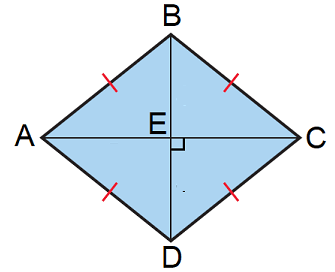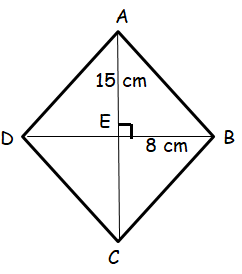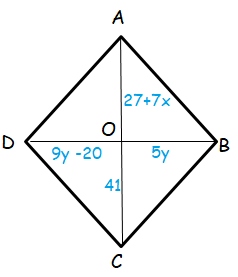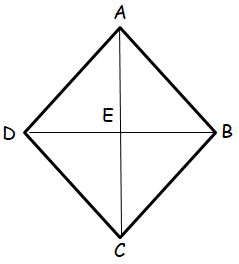FINDING PERIMETER OF RHOMBUS USING DIAGONALS
Subscribe to our ▶️ YouTube channel 🔴 for the latest videos, updates, and tips.
The diagonals of a rhombus will be perpendicular and they will bisect each other.

Perimeter of rhombus = 4a
Here a is the side length of rhombus.
Problem 1 :
In the rhombus ABCD shown below, if the lengths of the diagonals AC and BD are 10 units and 8 units respectively, find its perimeter.

Solution :
AC = 10 units, then AE = EC = 5 units
BD = 8 units, then BE = ED = 4 units.
To find the perimeter, we find the side length of the rhombus.
Let us consider the triangle BEC.
BC2 = BE2 + EC2
BC2 = 42 + 52
BC2 = 16 + 25
BC2 = 41
BC = √41
Perimeter of rhombus = 4√41 units.
Problem 2 :
What is the perimeter of a rhombus whose diagonals are 16 cm and 30 cm?
Solution :

In triangle AEB,
AB2 = AE2 + EB2
AB2 = 152 + 82
AB2 = 225 + 64
AB2 = 289
AB = 17 cm
Perimeter of the rhombus ABCD = 4(17)
= 68 cm
Problem 3 :
With in the information given below find x and y then find the perimeter of the rhombus.

Solution :
In rhombus, the diagonal will bisect each and 90 degree.
|
DO = OB 9y - 20 = 5y 9y -5y = 20 4y = 20 y = 20/4 y = 5 |
AO = OC 27 + 7x = 41 7x = 41 - 27 7x = 14 x = 14/7 x = 2 |
Applying the value of y in OB.
OB = 5(5) ==> 25
In triangle OCB,
BC2 = OC2 + OB2
BC2 = 412 + 252
BC2 = 1681 + 625
BC2 = 2306
BC = √2306
BC = 48.02
Perimeter of the rhombus = 4 (BC)
= 4(48.02)
= 192.08 units.
Problem 4 :
DB = 4x ft, EB = 30 ft
AC = (-y + 13) ft, AE = (5 - 2y) ft
Solve for x and y and find the perimeter.

Solution :
|
DB = 4x ft, EB = 30 ft DB/2 = EB 2x = 30 x = 30/2 x = 15 |
AC = (-y + 13) ft, AE = (5 - 2y) ft AC/2 = AE (13-y)/2 = 5 - 2y 13 - y = 2(5 - 2y) 13 - y = 10 - 4y -y + 4y = 10 - 13 3y = -3 y = -1 |
Applying the value of y in AC = (-y + 13)
AC = 14, AE = 7
AB2 = AE2 + EB2
AB2 = 72 + 302
AB2 = 49 + 900
AB = √949
AB = 30.80
Perimeter = 4(30.80)
= 123.2
Subscribe to our ▶️ YouTube channel 🔴 for the latest videos, updates, and tips.
Recent Articles
-
Finding Range of Values Inequality Problems
May 21, 24 08:51 PM
Finding Range of Values Inequality Problems -
Solving Two Step Inequality Word Problems
May 21, 24 08:51 AM
Solving Two Step Inequality Word Problems -
Exponential Function Context and Data Modeling
May 20, 24 10:45 PM
Exponential Function Context and Data Modeling